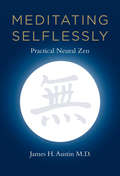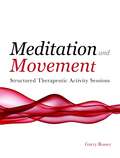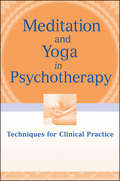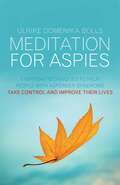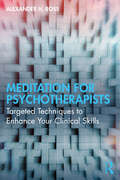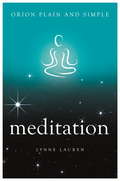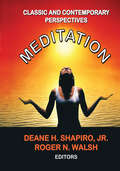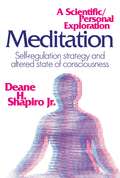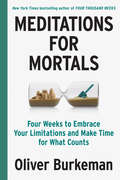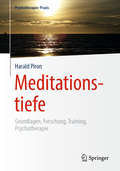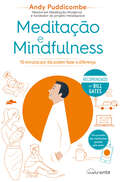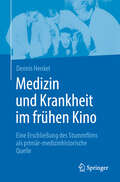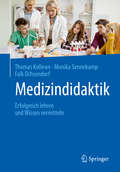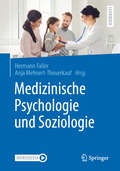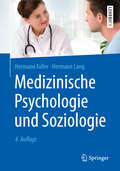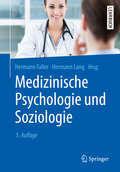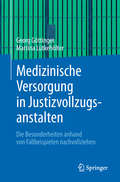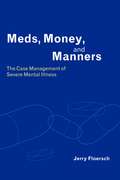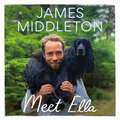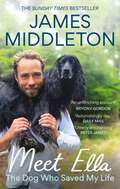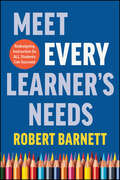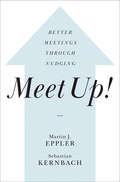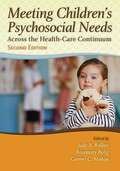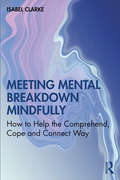- Table View
- List View
Meditating Selflessly: Practical Neural Zen
by James H. AustinA guide to Zen meditative practice informed by the latest findings in brain research. This is not the usual kind of self-help book. Indeed, its major premise heeds a Zen master's advice to be less self-centered. Yes, it is "one more book of words about Zen," as the author concedes, yet this book explains meditative practices from the perspective of a "neural Zen." The latest findings in brain research inform its suggestions. In Meditating Selflessly, James Austin—Zen practitioner, neurologist, and author of three acclaimed books on Zen and neuroscience—guides readers toward that open awareness already awaiting them on the cushion and in the natural world. Austin offers concrete advice—often in a simplified question-and-answer format—about different ways to meditate. He clarifies both the concentrative and receptive styles of meditation. Drawing widely from the exciting new field of contemplative neuroscience, Austin helps resolve an ancient paradox: why both insight wisdom and selflessness arise simultaneously during enlightened states of consciousness.
Meditation and Movement: Structured Therapeutic Activity Sessions
by Garry RosserMeditation and Movement is an accessible series of structured relaxation and self-awareness sessions to help strengthen students' self-control, resilience and respect for both themselves and others. This course of fourteen one-hour structured sessions is suitable for groups of children, teens and youths, and especially beneficial for, but not limited to, use in schools with pupils with disabilities, special educational needs, self-esteem issues or behavioural difficulties. The course combines skills from different disciplines, and includes: meditation practices; therapeutic writing and talking tasks; movement and psychodrama play activities; and breathing, posture and movement techniques found in some martial arts. Complete with clear and full instructions and photocopiable worksheets, Meditation and Movement is straightforward enough for any enthusiastic non-'expert' leader to use with ease. An ideal course text for school teachers, school counsellors and psychologists, these structured sessions will also appeal to a variety of societies and associations, such as Buddhist, martial arts and drama groups.
Meditation and Yoga in Psychotherapy
by C. Alexander Simpkins Annellen M. SimpkinsPraise for Meditation and Yoga in Psychotherapy"From the wisdom of ancient cultures to modern neuroscience, the authors skillfully create a bridge of understanding between the practice of meditation, yoga, and psychotherapy. The Simpkins are at their best in describing how everyone can learn to integrate their own brain, body, and mind to facilitate a creative synchrony of healing and well-being."--Kathryn Rossi, PhD Coeditor, Collected Works of Milton H. Erickson: The Nature of Therapeutic Hypnosis"This reader-friendly text is directed toward therapists and healthcare workers who are considering incorporating yoga and meditation into their work. These technologies are time-honored and appear to have beneficial effects on contemporary clients and patients. Meditation and Yoga in Psychotherapy serves as an informative introduction to these¿practices, and explains how a therapist might integrate such practices into their work. The chapters on neuroscience research and healthy aging are unique in books of this nature, and the discussion of alleviating depression alone is worth the price of the book."--Stanley Krippner, PhDProfessor of Psychology, Saybrook UniversityCoauthor, Haunted by Combat: Understanding PTSD in War VeteransA thoughtful and pragmatic guide for integrating meditation and yoga techniques into traditional psychotherapyMeditation and Yoga in Psychotherapy is an inspiring "how-to" guide grounded in the neuroscientific and clinical evidence that supports the use of meditation and other yoga practices to improve clients' mental health.Drawing from the authors' decades of practice, teaching, and writing, this inspiring book is focused on applying meditation, yoga, and Zen to therapy, with discussion of:The latest neuroscience findings, showing how the brain and larger nervous system are altered by yoga methodsPhilosophical and psychological principles upon which yoga is basedThe how, when, and why for use of specific techniques with common psychological problemsFundamental stretching exercises and meditation techniquesFilled with vivid case examples and writings from renowned yoga masters, Meditation and Yoga in Psychotherapy encourages a therapeutic process in which clients move their attention from outside concerns to inner mindfulness. With a range of techniques that embrace the diversity and uniqueness of clients, this book offers methods to creatively individualize techniques for a wide variety of presenting problems.
Meditation for Aspies: Everyday Techniques to Help People with Asperger Syndrome Take Control and Improve their Lives
by Ulrike Domenika Bolls Rowan SewellMeditation is an effective, life-long practice that can help people with Asperger Syndrome to steer their own life course and improve wellbeing. This useful guide provides Aspies with a clear explanation of how to reap the benefits of welcoming meditation practices into their lives. In addition to its great value as a relaxation technique, meditation can positively influence emotions, curb anxiety and meltdowns, and promote self-esteem and self-awareness. This book discusses why common Aspie character traits such as dedication and introversion make people with Asperger Syndrome particularly well suited to practicing meditation and offers guidance on choosing the right type of meditation to suit each individual's needs. With useful advice on how to begin, where to meditate, what to wear, and much more, the book shows that meditation can be a powerful everyday technique for personal development and self-discovery.
Meditation for Psychotherapists: Targeted Techniques to Enhance Your Clinical Skills
by Alexander H. RossMeditation for Psychotherapists provides students and practitioners of psychotherapy with specific meditation techniques.Chapters offer a comprehensive theoretical and practical approach as an adjunct to established professional development tools. This is the first time specific bespoke meditation techniques have been connected to different therapeutic modalities, building on the author’s already published work.The book is accompanied by a website with audio-guided meditations and courses directed to an international audience across multiple psychotherapy models www.arosspsychotherapy.com/meditation.
Meditation, Orion Plain and Simple (Plain and Simple)
by Lynne LaurenA practical guide to reducing stress and finding peace through meditation.Meditation is a practice that calms the mind and the body in a natural way. Its aim is to quiet or still the mind, which leads to calm awareness without the interference of troublesome thoughts. Meditation can help you focus, relax, and cope with life's twists and turns.Meditation, Orion Plain and Simple is a wise and helpful beginner's guide to the practice of meditation. Lynne Lauren not only explains why it is important to meditate, but also demonstrates how simple meditation can be. It can be done anywhere by anyone. Lynne provides a brief overview of the different types of meditation, along with more than 50 meditations and visualisations that can be used in different circumstances to reach particular goals.This simple guide provides all of the information that beginners will need to slow down, de-stress, and discover how rich life can be!
Meditation: Classic and Contemporary Perspectives
by Deane H. Shapiro Roger N. WalshMany claim that meditation is effective in the treatment of many ailments associated with stress and high blood pressure, and in the management of pain. While there are many popular books on meditation, few embrace the science as well as the art of meditation. In this volume, Shapiro and Walsh fill this need by assembling a complete collection of scholarly articles--Meditation: Classic and Contemporary Perspectives.From an academic rather than a popular vantage, the volume takes the claims and counterclaims about meditation to a deeper analytical level by including studies from clinical psychology and psychiatry, neuroscience, psychophysiology, and biochemistry. Each selection is a contribution to the field, either as a classic of research, or by being methodologically elegant, heuristically interesting, or creative. Original articles cover such topics as the effects of meditation in the treatment of stress, hypertension, and addictions; the comparison of meditation with other self-regulation strategies; the adverse effects of meditation; and meditation-induced altered states of consciousness.Concluding with a major bibliography of related works, Meditation offers the reader a valuable overview of the state and possible future directions of meditation research. Today, in the popular media and elsewhere, debate continues: Is meditation an effective technique for spiritual and physical healing, or is it quackery? Meditation: Classic and Contemporary Perspectives weighs in on this debate by presenting what continues to be the most complete collection of scholarly articles ever amassed on the subject of meditation.
Meditation: Self-regulation Strategy and Altered State of Consciousness
by Rosemary A. StevensDespite the increase in meditation studies, the quality remains variable; many of them are trivial, and most remain unreplicated. Research on meditation has been plagued by insubstantial theorizing, global claims, and the substitution of belief systems for grounded hypotheses. Meditation punctures some of the myths about meditation, while retaining a place of value for mediation as a normal human function.In each chapter includes discussion of the major questions addressed, followed by a detailed critique of important theoretical, clinical, and research issues. In several instances the reader may find that questions seem to beget questions: research bearing upon certain issues may be contradictory, or not yet of sufficient thoroughness. In these cases, the author suggests the specific future research necessary to resolve the questions posed, so that claims about meditation are justified, and which are not. The profession of psychology itself is, and has been, in a polarized debate between the "practitioners" and the "experimentalists." The latter accuse the former of being "soft, non-empirical, non-scientific," while practitioners accuse the experimentalists of conducting research which is essentially irrelevant to human concerns.This approach provides a bridge between research and clinical practice. Meditation provides an encompassing survey of the topic--nearly forty tables and figures; sample questionnaires, evaluations and programs and a detailed overview of a controversial field. Shapiro separates self-regulation with self-delusion, to outline questions and possible answers.
Meditations for Mortals: Four Weeks to Embrace Your Limitations and Make Time for What Counts
by Oliver BurkemanA map for a liberating journey toward a more meaningful life―a journey that begins where we actually find ourselves, not with a fantasy of where we&’d like to be―from the New York Times bestselling author of Four Thousand WeeksHow would life open up if we stopped treating it as a problem to be solved?Addressing the fundamental questions about how to live, Meditations for Mortals offers a powerful new way to take action on what counts: a guiding philosophy of life Oliver Burkeman calls &“imperfectionism.&” It helps us tackle challenges as they crop up in our daily lives: our finite time, the lure of distraction, the impossibility of doing anything perfectly.How can we embrace our nonnegotiable limitations? Or make good decisions when there&’s always too much to do? How do we shed the illusion that life will really begin as soon as we can &“get on top of everything&”? Reflecting on quotations drawn from philosophy, religion, literature, psychology, and self-help, Burkeman explores a combination of practical tools and daily shifts in perspective. The result is a life-enhancing and surprising challenge to much familiar advice―and a profound yet entertaining crash course in living more fully.
Meditationstiefe: Grundlagen, Forschung, Training, Psychotherapie (Psychotherapie: Praxis)
by Harald PironPsychotherapeuten und Berater in Klinik und Praxis erfahren in diesem Buch einen wissenschaftlich fundierten Einblick in die Tiefe der meditativen Erfahrungswelt. Im Mittelpunkt steht der Einsatz von meditativen Elementen in verschiedenen Settings – und zwar religionsfrei, evidenzbasiert, auf Erfahrung, Entwicklung und Verständnis ausgerichtet.Der Autor ist u. a. Gründer und Moderator des KV-anerkannten Qualitätszirkels für meditationsbasierte Psychotherapie und stellt ein evidenzbasiertes Handlungsmodell, ein ausführliches Praxis-Manual zur Förderung von Meditationstiefe und einen Fragebogen zur Verfügung. Kernprinzipien, Impulse für die Praxis, Übungsanleitungen und Empfehlungen, die sich aus den empirischen Ergebnissen ableiten lassen, werden auf verständliche Weise vermittelt und in didaktisch sinnvollen, praktikablen Schritten anwendbar gemacht. Mit einem Geleitwort von Dr. Ulrich Ott. Geschrieben für … Psychologische und Ärztliche Psychotherapeuten, Kursleiter in Reha-Einrichtungen, Entspannungstrainer, Coaches, Gesundheitsberater. Über den Autor: Dr. phil. Dipl.-Psych. Harald Piron ist niedergelassener Psychologischer Psychotherapeut (VT) in Bonn; u. a. Mitgründer und Vorstandsmitglied der SMMR (Society for Meditation and Meditation Research), Gründer und Moderator des KV-anerkannten Qualitätszirkels für meditationsbasierte Psychotherapie.
Meditação e Mindfulness
by Andy PuddicombeAprenda como 10 minutos de meditação por dia podem fazer a diferença e mudar a sua vida. Este é um livro sobre meditação. Mas não é igual aos outros. Aqui não há cânticos, não precisamos de nos sentar com as pernas cruzadas, ou ter qualquer tipo de fé. Nem sequer exige o dispêndio de longos períodos de tempo. Pelo contrário, este livro mostra-lhe como apenas 10 minutos de meditação por dia podem fazer a diferença e mudar a sua vida. Andy Puddicombe, em tempos monge budista, é hoje reconhecido como o especialista em meditação e mindfulness mais importante do Reino Unido, contando já com mais de dez anos de experiência como formador. Tal como os seus leitores e alunos, também ele começou a sua prática de meditação para conseguir lidar com as preocupações do quotidiano. Foi este contexto que lhe permitiu desenvolver um programa de meditação guiada adequado à rotina diária: exercícios que mostram que apenas alguns minutos por dia bastam para fazer a diferença. A experiência do autor reflete-se nos exercícios, histórias e técnicas que permitirão acalmar a agitação da mente e criar as condições para: • a melhoria da concentração e da produtividade; • o alívio do stress e da ansiedade; • um sono mais tranquilo; • melhores relações afetivas e profissionais. «Andy Puddicombe está a fazer com a meditação aquilo que Jamie Oliver fez com a gastronomia.» The New York Times
Medizin und Krankheit im frühen Kino: Eine Erschließung des Stummfilms als primär-medizinhistorische Quelle
by Dennis HenkelDas frühe Kino – der Stummfilm (ca. 1895-1927) – erscheint vielen Zuschauern auch heute noch in einem unschmeichelhaften Licht. Oft wird es als eine Art unfertiger Vorläufer des Ton-Kinos, des „richtigen Films“, wahrgenommen, welcher neben der Tonlosigkeit auch noch zu theatralischem Schauspiel, Schwarz-Weiß-Optik und hektisch-beschleunigter Wiedergabegeschwindigkeit neige – „Opas Kino“, sagt der Volksmund. Doch dieses Vorurteil verblasst: Der Stummfilm wird als Kunstform wahrgenommen. Der Autor begibt sich auf Spurensuche: Welchen historischen Beitrag kann die Erschließung dieser Kunstform mit ihrer Darstellung großer Fachgebiete wie Psychiatrie, Neurologie, Innere Medizin und Chirurgie leisten? Finden sich auch Disziplinen wie Zahnmedizin, Gynäkologie oder Dermatologie wieder? In 453 untersuchten „medizinischen Filmen“ finden sich viele ethische Kontroversen des frühen 20. Jahrhunderts – z. B. Geburtenkontrolle, Eugenik oder Homosexualität – wieder, was das Potential des Kinos als Zeitzeuge unterstreicht. Seine unterschätzten Funktionen als zeit- wie medizinhistorische Quelle und Spiegel der Gesellschaft werden herausgearbeitet, zudem können neue filmhistorische Strömungen definiert und das zentrale Leitmotiv der Medizindarstellung im frühen Film abgeleitet werden: die Iatro- und Pathophobie. Diese Ergebnisse offenbaren verblüffende Qualitäten einer rasch zum Massenmedium avancierten Kunstform, die Denken und Handeln der Kinogänger – und damit die Medizingeschichte – prägte. Der Autor Dr. Dennis Henkel studierte Philosophie, Theater-Film-Fernsehwissenschaften, Kunstgeschichte an der Universität zu Köln. Er promovierte zum Thema „Darstellung von Sucht und Drogen in frühen Film“ und ist seitdem als Dozent, Autor, und Herausgeber und am Institut für Geschichte und Ethik der Medizin in Köln tätig, zuletzt zum Thema Demenzdarstellung im Film. Eine abgewandelte Version des vorliegenden Buches wurde im Jahre 2024 als Habilitationsschrift an der Medizinischen Fakultät in Köln eingereicht.
Medizindidaktik: Erfolgreich Lehren Und Wissen Vermitteln
by Thomas Kollewe Monika Sennekamp Falk OchsendorfDiese praxisorientierte Kurzanleitung richtet sich an Lehrende in medizinischen Studiengängen, die ihre Lehrkompetenz aufbauen oder verbessern wollen - mit vielen Tipps zum direkten Transfer in die eigene Lehre. Markant illustriert, präsentieren die Autoren das didaktische Handwerkszeug von der Planung über die Durchführung und Vermittlung der Inhalte bis zum Überprüfen und Bewerten des Lernerfolgs bei den Studierenden. Das Buch bietet Anwendungsbeispiele u.a. für Vorlesungen, Seminare und interne Fortbildungsveranstaltungen an Kliniken. Es liefert konkrete Hinweise zur Betreuung und Anleitung von Famulanten, PJ´lern oder Studierenden im Blockpraktikum auf der Station und für den Unterricht am Krankenbett
Medizinische Psychologie und Soziologie
by Barbara BrendelMedizinische Psychologie und Soziologie Mit diesem Buch erhalten Sie einen kompakten und vollständigen Überblick über alle prüfungsrelevanten Themen der Medizinischen Psychologie und Soziologie. Durch das neue farbige Layout können Sie Kerninhalte, Zusatzinhalte und klinische Inhalte schnell unterscheiden. Das Buch enthält sämtliche theoretischen und methodischen Aspekte für eine gelungene Arzt-Patient-Beziehung. Die allgemeine Anamnese und Gesprächsführungsmethoden werden dabei ebenso dargestellt wie spezielle Situationen z.B. in der Onkologie, Palliativ-, Sexual- und Intensivmedizin. Zu Fachbegriffen gibt es verständliche Erklärungen, zahlreiche Fallbeispiele aus der Klinik stellen den Bezug zur Praxis her. Und für den Wissens-Check stehen Ihnen jede Menge FlashCards zur Verfügung. Neu in der 6. Auflage: Neues vierfarbiges Layout Alle Abbildungen wurden überarbeitet FlashCards zur Prüfungsvorbereitung Ihre Lernhilfen: Lernziele am Kapitelanfang für einen schnellen Überblick Zahlreiche Klinikbeispiele Begriffserklärungen erläutern alle Fachtermini Die wichtigsten Fakten übersichtlich für die Prüfung in Boxen Zusätzlich vertiefende Hintergrundinformation und weiterführende Literaturtipps Die Herausgeber Prof. Dr. med. Dr. phil. Hermann Faller ist ehemaliger Leiter der Abteilung für Medizinische Psychologie und Psychotherapie, Medizinische Soziologie und Rehabilitationswissenschaften der Universität Würzburg. Prof. Dr. phil. Anja Mehnert-Theuerkauf ist Leiterin der Abteilung für Medizinische Psychologie und Medizinische Soziologie der Universität Leipzig.
Medizinische Psychologie und Soziologie
by Hermann Faller Hermann LangDieses Buch gibt einen Überblick über sämtliche theoretischen und methodischen Grundlagen der Psychologie und der Soziologie, die für die Arzt-Patient-Beziehung von Bedeutung sind. Die Situation des Patienten zu verstehen und adäquat auf ihn einzugehen, steht dabei im Zentrum. Besondere medizinische Situationen wie zum Beispiel aus der Onkologie, Palliativmedizin, Sexualmedizin und Intensivmedizin werden ebenso beleuchtet wie die Anamnese und Untersuchung. Das bewährte didaktische Konzept macht das Lernen leicht: Alle Themen aus dem GK sind enthalten, die wichtigen Prüfungsinhalte sind hervorgehoben. Der Text ist klar und einfach geschrieben und übersichtlich aufgebaut. Lernziele am Kapitelbeginn geben einen Überblick über das, was hängen bleiben soll. Definitionen, klinische Beispiele, Übersichten und Zusammenfassungen zum Wiederholen der wichtigsten Begriffe helfen beim Verstehen und Lernen. Und für die weiter Interessierten bieten die Exkurse und die kommentierten Literaturhinweise einen guten Einstieg. Die Autoren Prof. Dr. med. Dr. phil. Hermann Faller ist Leiter der Abteilung für Medizinische Psychologie und Psychotherapie, Medizinische Soziologie und Rehabilitationswissenschaften, Würzburg. Prof. Dr. med. Dr. phil. Hermann Lang ist ehemaliger Vorstand des Instituts für Psychotherapie und Medizinische Psychologie der Universität Würzburg.
Medizinische Psychologie und Soziologie (Springer-Lehrbuch)
by Hermann Faller Hermann LangDieses Buch gibt einen Überblick über sämtliche theoretischen und methodischen Grundlagen der Psychologie und der Soziologie, die für die Arzt-Patient-Beziehung von Bedeutung sind. Die Situation des Patienten zu verstehen und adäquat auf ihn einzugehen, steht dabei im Zentrum. Besondere medizinische Situationen wie zum Beispiel aus der Onkologie, Palliativmedizin, Sexualmedizin und Intensivmedizin werden ebenso beleuchtet wie die Anamnese und Untersuchung. Das bewährte didaktische Konzept macht das Lernen leicht: - Alle Themen aus dem GK sind enthalten, die wichtigen Prüfungsinhalte sind hervorgehoben. - Der Text ist klar und einfach geschrieben und übersichtlich aufgebaut. - Lernziele am Kapitelbeginn geben einen Überblick über das, was hängen bleiben soll. - Definitionen, klinische Beispiele, Übersichten und Zusammenfassungen zum Wiederholen der wichtigsten Begriffe helfen beim Verstehen und Lernen. - Und für die weiter Interessierten bieten die Exkurse und die kommentierten Literaturhinweise einen guten Einstieg.
Medizinische Versorgung in Justizvollzugsanstalten: Die Besonderheiten anhand von Fallbeispielen nachvollziehen
by Georg Göttinger Martina LütkehölterDas vorliegende Werk beschreibt anhand zahlreicher Fallbeispiele die Besonderheiten der medizinischen Versorgung in einer Justizvollzugsanstalt. Dargestellt werden die Grundlagen des ärztlichen Handelns und die medizinischen Tätigkeitsfelder im Justizvollzug ebenso wie die Thematik des Suchtmittelmissbrauchs und die Aufgaben der Fachaufsicht. Das Werk wendet sich an Ärzte aller Fachdisziplinen, die dauerhaft oder auch nur vorübergehend in einem Gefängnis arbeiten, z.B. im Rahmen des kassenärztlichen Notdienstes. Aber auch Psychologen, Anstaltsleitern und Vollzugsleitern bietet das Werk wertvolle Hinweise und einen praxisnahen Einblick.
Meds, Money, and Manners: The Case Management of Severe Mental Illness
by Jerry FloerschAs case management has replaced institutional care for mental health patients in recent decades, case management theory has grown in complexity and variety of models. But how are these models translated into real experience? How do caseworkers use both textbook and practical knowledge to assist clients with managing their medication and their money? Using ethnographic and historical-sociological methods, Meds, Money, and Manners: The Case Management of Severe Mental Illness uncovers unexpected differences between written and oral accounts of case management in practice. In the process, it suggests the possibility of small acts of resistance and challenges the myth of social workers as agents of state power and social control.
Meet Ella: The Dog Who Saved My Life
by James Middleton'It's been a long time since a book has touched me this much. Beautifully written, utterly enchanting, searingly honest and deeply moving' - Peter James, bestselling author and creator of the Superintendent Roy Grace series'Meet Ella is so profoundly moving. It greatly resonated with me, both personally and professionally, and James' story is written so beautifully, and with such clarity and honesty' - Joanna Cannon, bestselling author of The Trouble with Goats and SheepWhen he was a child, James Middleton wanted nothing more than a dog of his own. Struggling to connect in the classroom, James would often take off in pursuit of nature and animals - adventuring in the Berkshire countryside, tinkering with rusty farm machinery, performing locum care to injured creatures, and losing himself for hours to the outdoors.Then, finally, his pleas for a dog (made via handwritten letters to his parents) were answered.Meet Ella traces the extraordinary bond between James and his beloved first pup, Ella. From their enchanting introduction when James was just twenty and their many expeditions, from Scottish mountain sides to royal weddings, their journey is marked by love, loyalty, and unexpected twists of fate. Ella, the well-mannered and kind-natured companion, accompanied James everywhere, even playing a pivotal role in introducing him to his future wife, Alizee.But beyond the glamorous veneer of society engagements and entrepreneurial achievements lies a deeply personal account of James' battle with depression. Through unconditional love, Ella emerges as an intuitive friend, reading James' moods and offering solace during his darkest hours, becoming the catalyst for his healing journey, and helping him to see all the good in his life and future.Touching, honest and life affirming, Meet Ella is both devastating and wonderfully heart-warming. A love letter to man's best friend, and a beacon of hope to anyone struggling through hard times.
Meet Ella: The Dog Who Saved My Life
by James Middleton'It's been a long time since a book has touched me this much. Beautifully written, utterly enchanting, searingly honest and deeply moving' - Peter James, bestselling author and creator of the Superintendent Roy Grace series'Meet Ella is so profoundly moving. It greatly resonated with me, both personally and professionally, and James' story is written so beautifully, and with such clarity and honesty' - Joanna Cannon, bestselling author of The Trouble with Goats and SheepWhen he was a child, James Middleton wanted nothing more than a dog of his own. Struggling to connect in the classroom, James would often take off in pursuit of nature and animals - adventuring in the Berkshire countryside, tinkering with rusty farm machinery, performing locum care to injured creatures, and losing himself for hours to the outdoors.Then, finally, his pleas for a dog (made via handwritten letters to his parents) were answered.Meet Ella traces the extraordinary bond between James and his beloved first pup, Ella. From their enchanting introduction when James was just twenty and their many expeditions, from Scottish mountain sides to royal weddings, their journey is marked by love, loyalty, and unexpected twists of fate. Ella, the well-mannered and kind-natured companion, accompanied James everywhere, even playing a pivotal role in introducing him to his future wife, Alizee.But beyond the glamorous veneer of society engagements and entrepreneurial achievements lies a deeply personal account of James' battle with depression. Through unconditional love, Ella emerges as an intuitive friend, reading James' moods and offering solace during his darkest hours, becoming the catalyst for his healing journey, and helping him to see all the good in his life and future.Touching, honest and life affirming, Meet Ella is both devastating and wonderfully heart-warming. A love letter to man's best friend, and a beacon of hope to anyone struggling through hard times.
Meet Every Learner's Needs: Redesigning Instruction So All Students Can Succeed
by Robert BarnettClassroom-tested strategies to inspire true student learning Meet Every Learner's Needs delivers research-backed techniques to transform classrooms into dynamic learning environments in which all students are appropriately challenged—and appropriately supported—every day. Based on teacher and Modern Classrooms Project cofounder Robert Barnett's experience training thousands of teachers worldwide, this book provides a methodology for K-12 educators to design lessons and courses that respond to individual learners' unique needs and help every learner develop authentic understanding. This approach has empowered educators and students in all grade levels and content areas, everywhere from underperforming inner-city public schools to elite international schools, across all fifty states and over 150 countries. The book includes highly practical tips and templates, which busy teachers can use to provide better instruction immediately. Throughout the book, readers will learn how to: Make direct instruction accessible and engaging to all learners Develop strong personal relationships with and between learners Create efficient learning experiences that give learners ownership and autonomy Share this approach with their colleagues and communities Meet Every Learner's Needs will leave readers both inspired and empowered to redesign instruction in their classrooms and communities. It will help educators, administrators, and parents take immediate action to create learning experiences that help all students truly succeed.
Meet Up!: Better Meetings Through Nudging
by Martin J. Eppler Sebastian KernbachThis book is about meetings and providing a new perspective from behavioural economics called nudging to make meetings more productive and enjoyable. Nudging hacks into the fast, automatic, subconscious system in human reasoning to breed success in every get-together. Once you know the foundations of focus, orientation, involvement, and commitment, the advantages of nudging are evident. The authors provide an explanation of nudge theory and 6 principles of how nudging affects our behavior. Examples from the actions and choices of the Dalai Lama, Ray Dalio, and Barack Obama demonstrate how nudging can make a difference. Based on theory, the book also gives 100 very practical nudges to improve meeting productivity that can be used by any meeting leader or participant.
Meeting Children's Psychosocial Needs Across the Health-Care Continuum
by Rosemary Bolig Judy A. Rollins Carmel C. MahanThis book captures the many developments in children's health care since the last edition, integrating current research and theory within the framework of a new and transitioning health-care environment. New to this second edition is the exploration of family and community issues and the impact on children’s psychosocial health and well-being. For, children in all settings continue to need nurturing, predictability, adequate stimulation, interaction, a sense of control, and mastery of their environments. The book concludes with an Epilogue that addresses trends in children's health care, providing thought-provoking ideas for new directions in psychosocial care of children and their families across the health-care continuum. E-Book Instructor's Manual is included with desk copy.
Meeting Democracy
by Donatella Della Porta Dieter RuchtThe concepts of power and democracy have been extensively studied at the global, national and local levels and within institutions including states, international organizations and political parties. However, the interplay of those concepts within social movements is given far less attention. Studies have so far mainly focused on their protest activities rather than the internal practices of deliberation and democratic decision-making. 'Meeting Democracy' presents empirical research that examines in detail how power is distributed and how consensus is reached in twelve global justice movement organizations, with detailed observations of how they operate in France, Germany, Italy, Spain, Switzerland and the UK. Written by leading political scientists and sociologists, this work contributes significantly to the wider literature on power and deliberative democracy within political science and sociology.
Meeting Mental Breakdown Mindfully: How to Help the Comprehend, Cope and Connect Way
by Isabel ClarkeMeeting Mental Breakdown Mindfully introduces the Comprehend, Cope and Connect (CCC) approach, developed and evaluated within mental health services, to a wider audience who need to understand mental health issues, whether for themselves or to support others. The book deconstructs and normalizes mental breakdown, starting from the individual’s inner experience, leading to practical ways of helping people out of distress and impaired functioning, towards the realization of their whole potential. It is based on an understanding of connections in the brain founded in cognitive science, which explains how human functioning can easily go astray. CCC provides a compelling rationale for putting mindfulness at the heart of the solution, along with other ways of coping with emotions and changing behaviour. The approach is brought to life through three illustrative case histories, giving a representative and realistic insight into both the experience of the individual and the workings of the system. Meeting Mental Breakdown Mindfully will help mental health professionals and those in related fields identify more accurately what people in their organization or under their care are going through.
